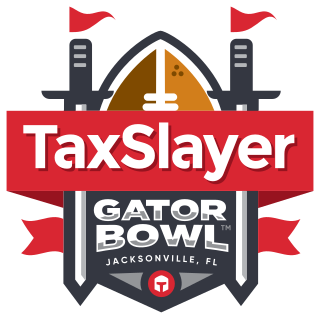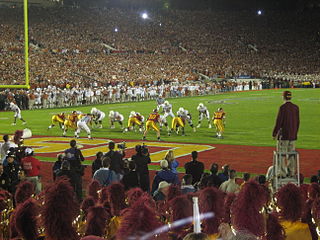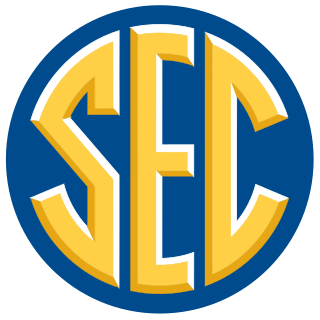Related Research Articles

The Gator Bowl is an annual college football bowl game held in Jacksonville, Florida, operated by Gator Bowl Sports. It has been held continuously since 1946, making it the sixth oldest college bowl, as well as the first one ever televised nationally. The game was originally played at Gator Bowl Stadium through the December 1993 game. The December 1994 game was played at Ben Hill Griffin Stadium in Gainesville after the namesake stadium was demolished to make way for a replacement venue, Jacksonville Municipal Stadium. That venue, now known as EverBank Stadium, has been home to the Gator Bowl since the January 1996 game.

The Peach Bowl is an annual college football bowl game played in Atlanta, Georgia, since December 1968. Since 1997, it has been sponsored by Chick-fil-A and is officially known as the Chick-fil-A Peach Bowl. From 2006 to 2013, it was officially referred to as simply the Chick-fil-A Bowl. The winner of the bowl game is awarded the George P. Crumbley Trophy, named after the game's founder George Crumbley.

In North America, a bowl game, or simply bowl, is one of a number of postseason college football games that are primarily played by teams belonging to the NCAA's Division I Football Bowl Subdivision (FBS). For most of its history, the Division I Bowl Subdivision had avoided using a playoff tournament to determine an annual national champion, which was instead traditionally determined by a vote of sports writers and other non-players. In place of such a playoff, various cities across the United States developed their own regional festivals featuring postseason college football games. Prior to 2002, bowl game statistics were not included in players' career totals. Despite attempts to establish a permanent system to determine the FBS national champion on the field, various bowl games continue to be held because of the vested economic interests entrenched in them.

The 2002 NCAA Division I-A football season ended with a double overtime national championship game. Ohio State and Miami both came into the Fiesta Bowl undefeated. The underdog Buckeyes defeated the defending-champion Hurricanes 31–24, ending Miami's 34-game winning streak. Jim Tressel won the national championship in only his second year as head coach.

The 2004 NCAA Division I-A football season was the highest level of college football competition in the United States organized by the National Collegiate Athletic Association (NCAA). The regular season began on August 28, 2004 and ended on December 4, 2004. The postseason concluded on January 4, 2005 with the Orange Bowl, which served as the season's BCS National Championship Game.

The Florida Gators football program represents the University of Florida (UF) in American college football. Florida competes in the Football Bowl Subdivision (FBS) of the National Collegiate Athletic Association (NCAA) and the Eastern Division of the Southeastern Conference (SEC) They play their home games on Steve Spurrier-Florida Field at Ben Hill Griffin Stadium on the university's Gainesville campus.
The 2007 Chick-fil-A Bowl was college football bowl game between the Clemson Tigers and the Auburn Tigers played in Atlanta, Georgia on December 31, 2007. With sponsorship from Chick-fil-A, it was the 40th edition of the game known throughout most of its history as the Peach Bowl. Clemson University represented the Atlantic Coast Conference (ACC) and Auburn University represented the Southeastern Conference (SEC) in the competition. The game was the final competition of the 2007 football season for each team. In exchange for the right to pick the first ACC team after the Bowl Championship Series selections, bowl representatives paid $3.25 million to the ACC, while the SEC, whose fifth team was selected, received $2.4 million. The combined $5.65 million payout is the seventh-largest among all college football bowl games, and the fourth-largest non-BCS bowl game payout.
The 2008 Chick-fil-A Bowl was a college football bowl game between the Louisiana State Tigers and the Georgia Tech Yellow Jackets played in Atlanta, Georgia on December 31, 2008. With sponsorship from Chick-fil-A, it was the 41st edition of the game known throughout most of its history as the Peach Bowl. LSU was from the Southeastern Conference (SEC), and their opponent represented the Atlantic Coast Conference (ACC). It was the final game of the 2008 football season for each team. The game payout was a combined $6.01 million, the sixth-largest among all college football bowl games and the third-largest non-BCS bowl game payout.

The 2009 Southeastern Conference football season started on Thursday, September 3 as conference member South Carolina visited North Carolina State. The conference's other 11 teams began their respective 2009 season of NCAA Division I FBS competition on Saturday, September 5. All teams started their season at home except Kentucky, who started their season on neutral turf at Paul Brown Stadium in Cincinnati, Ohio against Miami (OH), Georgia, who traveled to Oklahoma State, and Alabama, who traveled to the Georgia Dome to face Virginia Tech in the Chick-fil-A College Kickoff for the second straight year.

The 2010–11 NCAA football bowl games concluded the 2010 NCAA Division I FBS football season and included 35 team-competitive bowl games and four all-star games. The games began play with three bowls on December 18, 2010 and included the 2011 BCS National Championship Game in Glendale, Arizona played on January 10 at the University of Phoenix Stadium. The bowl season concluded with the East–West Shrine Game, the Eastham Energy All-Star Game, the Senior Bowl, the Dixie Gridiron Classic, and the NFLPA Game. One bowl, the Toronto-based International Bowl, has ceased operations.

The 2005 Tennessee Volunteers represented the University of Tennessee in the 2005 NCAA Division I-A football season. Playing as a member of the Southeastern Conference (SEC) Eastern Division, the team was led by head coach Phillip Fulmer, in his thirteenth full year, and played their home games at Neyland Stadium in Knoxville, Tennessee. They finished the season with a record of five wins and six losses, and failed to qualify for a bowl game for the first time during Fulmer's tenure as head coach and the first time overall since 1988.

The New Year's Six, sometimes abbreviated as NY6, are the following NCAA Division I Football Bowl Subdivision (FBS) bowl games: the Rose Bowl, Sugar Bowl, Orange Bowl, Cotton Bowl, Peach Bowl, and Fiesta Bowl. These games are played annually on or around New Year's Day and represent six of the ten oldest bowl games played at the FBS level.
References
- General
- National Collegiate Athletic Association (NCAA). "Bowl/All-Star Game Records" (PDF). 2016 NCAA Division I Football Records. NCAA.org. Retrieved December 14, 2016.
- Specific
- ↑ Bowl/All-Star Game Records, p. 18
- ↑ Bowl/All-Star Game Records, p. 28
- ↑ Dunnavant, Keith (2004). The Fifty-Year Seduction: How Television Manipulated College Football, from the Birth of the Modern NCAA to the Creation of the BCS. Macmillan. pp. 93–99. ISBN 9780312323455 . Retrieved March 11, 2012.
- ↑ Bowl/All-Star Game Records, pp. 33
- ↑ "Tennessee Invades East to Show Class in Trouncing N.Y.U 13-0".
- ↑ Brown, Gary; Mike Morrison; Michael Morrison (2008). ESPN Sports Almanac 2008 . ESPN. p. 187. ISBN 1933060387.
- ↑ Bowl/All-Star Game Records, pp. 10–11
- 1 2 Bowl/All-Star Game Records, p. 8
- ↑ Sparks, Adam (July 15, 2023). "These Tennessee football wins under Jeremy Pruitt have been vacated". USA Today . Retrieved July 16, 2023.